A tincture is a great way to extract the powerful medicine locked away in plants and preserve it for later use. While teas will spoil within a few days, tinctures will keep at room temperature for months if not years – yes, years – without spoiling or losing their effectiveness.
While some medicines are soluble in water, and will come right out of the plant material in a simple tea, other medicines need something a bit stronger for extraction. The anti-inflammatory compounds in Goldenseal are a good example. Goldenseal can be boiled for hours without extracting the most potent anti-inflammatory compounds. A simple alcohol solution, on the other hand, can pull this out with ease.
Some compounds are water soluble, while others are only alcohol soluble. Other compounds, like the immune boosting compounds in Echinacea, are extraditable either by water or alcohol. Do your research, and find out if the herb your trying to use is best used as a tea or tincture.
If your herbs are alcohol soluble, it’s actually remarkably simple to make your own tinctures at home.
Related: 10 Potent Plants That Kill Pain Fast
Start
Start with a non-reactive seal-able container, such as a glass jar. Choose your herbs, either fresh or dried. For a tincture, it’s fine to use either. Just know that you’ll need more fresh herb to achieve the same strength as you would dried.
Chop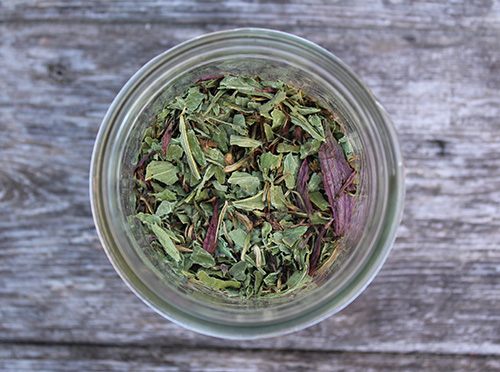
Finely chop your herbs with a knife, or grind them down with a mortar and pestle to increase surface area. The more surface area, the more opportunity for the alcohol in your tincture to extract as much potent medicine as possible.
Measurements
There are a number of different ways to measure the herbs and adjust the strength of the tincture, but regardless of how much herb material you measure, the final strength will largely be determined by the strength of the herbs you start with. There’s a lot of variation in plant material based on how it was grown and stored before use.
Related: How To Make a Powerful Calendula Extract to Keep in Your Medicine Cabinet (with pictures)
The folk method of tincture, which is by far the most popular for home use, takes this into account and skips weighing and measuring the herbs. Just pack the herbs into a jar, and cover completely with a neutral alcohol, such as vodka.
As you take your medicine, you’ll need to adjust the dose to both the strength of the herbs and your constitution.
Alcohol
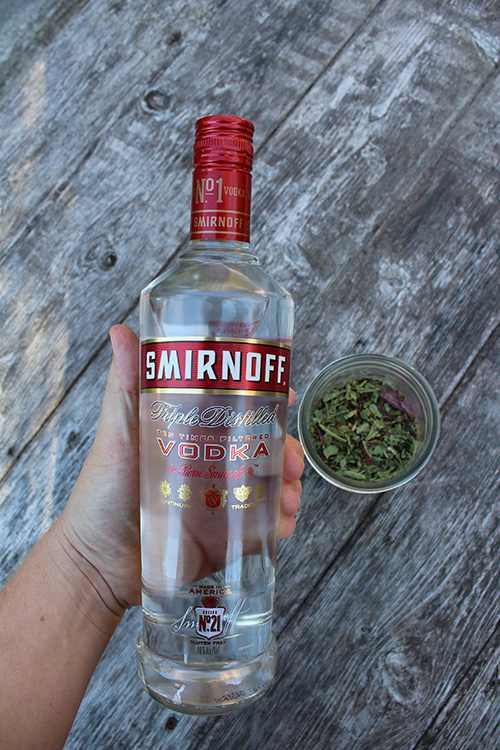 In choosing alcohol for your tincture, ideally you’re looking for an alcohol around 80 proof for most herbs. Higher alcohol percentages, like those in grain alcohol or ever-clear, are necessary for extracting resins, but shouldn’t be used for more delicate plant matter.
In choosing alcohol for your tincture, ideally you’re looking for an alcohol around 80 proof for most herbs. Higher alcohol percentages, like those in grain alcohol or ever-clear, are necessary for extracting resins, but shouldn’t be used for more delicate plant matter.
Technically, just about any type of alcohol can be used to make a tincture. If you have an abundant supply of whiskey, rum or gin around but no vodka, that works just fine in a pinch. The flavor will be different, but that’s not necessarily a bad thing.
If infusing in whiskey helps you (or a reluctant loved one) take their medicine, by all means go for it. An effective medicine is one that you’ll use, so make sure that you choose both herbs and an alcohol that fits the patient.
If you’re shopping specifically for a tincture, choose the cheapest vodka you’d voluntarily drink. For me, that’s one or two steps up from the bottom shelf. Remember, you’re going to have to drink this medicine and if you choose something particularly harsh, you’re much less likely to take your medicine.
How To
Pour the alcohol into your jar of herbs, and be sure that all the herbs are submerged. The herbs will need to stay submerged while you store your jar in a cool dark place for 4-6 weeks to extract. Every 2-3 days, or as often as you remember, shake your jar to help the extraction.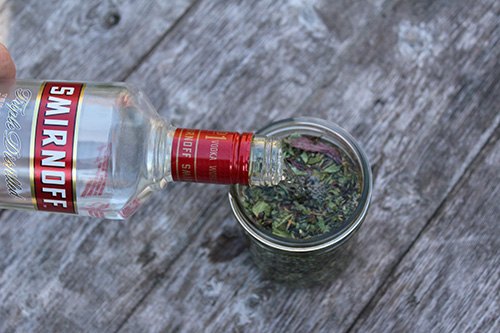
Once the extraction is complete, strain the herbs out using cheesecloth or a fine mesh strainer, and discard the herbs.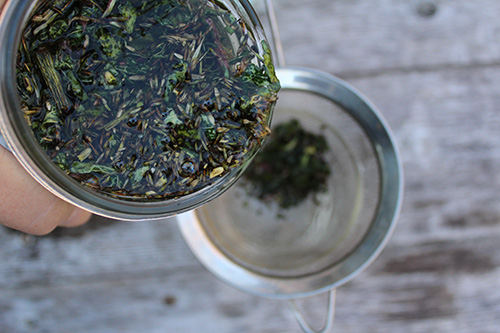
While it may be tempting to try to extract those herbs a second time into a tea or right into another tincture, each time I’ve tried it I was sorry I did. What’s left is bitter and unpleasant, even if the starting herb was something as lovely as elderberries. Stick to a single extraction, trust me on this one.
At this point, your tincture is ready for use. Store it in tinted glass, like dark brown colored tincture dropper bottles, or something with a similar tint to prevent sunlight from deteriorating your herbal medicine. In a pinch, any clean, dark colored bottle that caps securely will work. Lacking tinted glass, be sure to keep your tincture in a dark cupboard for storage.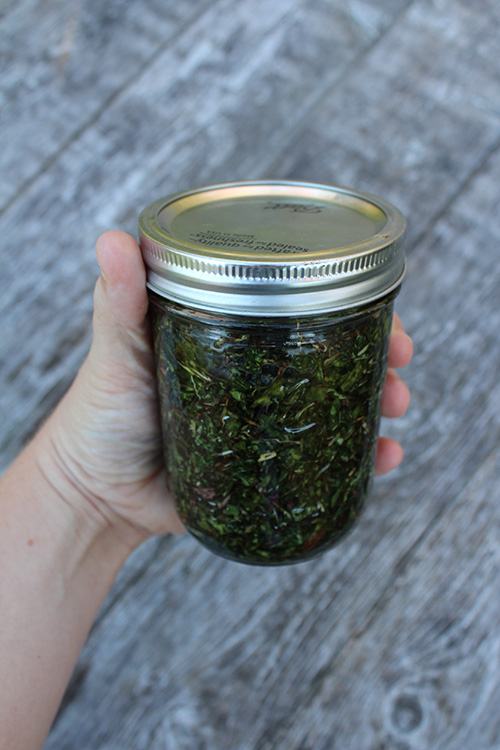
Dosage will depend on the tincture and your constitution. Some take tinctures with an eye dropper. Milder tinctures, like elderberry or chamomile, can be poured into a small shot glass.
For bitter herbs, like Echinacea, it’s best to dilute a dropper full of the finished tincture in a glass of water or juice.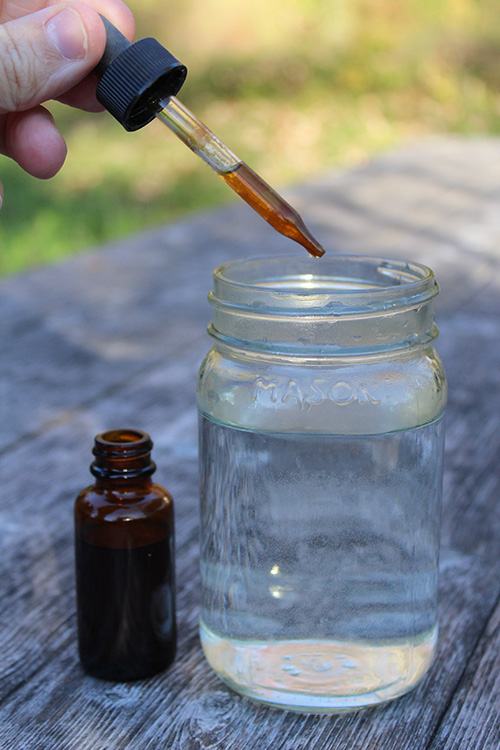
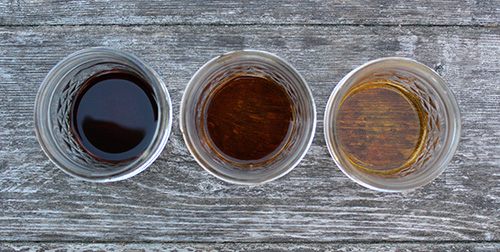
As always, with any medicine, be sure to watch for reactions and be careful about potential interactions with other medicines you’re taking, herbal or prescription.
You may also like:
 40 Bizarre Home Remedies Our Grandparents Taught Us That Actually Work
40 Bizarre Home Remedies Our Grandparents Taught Us That Actually Work
Would You Recognize These Fatal Mistakes In A Crisis? (video)
Just Like Doxycycline: The Antibiotic That Grows in Your Backyard

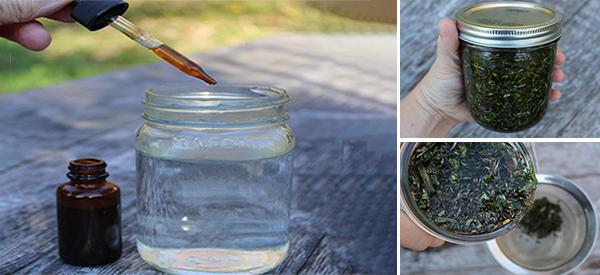




















I use the following.
1/4 cup diced ginger root.
1/8 cup of diced garlic.
1/4 cup of lemon juice.
1/2 cup of honey.
Mix well and seal in a mason jar and can it.
Is that all you use? No alcohol? Your description sounds more like it’s to be eaten rather than to be sipped or taken in a teaspoon. Maybe you could expand your description further? Thanks!
What is this tincture used for?
I drink boiled ginger root..add lemon juice and raw honey to a mug and make sure I drink two or more all winter never been sick. I ran a kitchens for years made my cooks drink it those who did never got sick and those who didn’t got sick..swear by it so do all my old cooks and friends as well as my once sceptic wife..
I used fresh elderberries for a tincture and tried it. It tasted like elderberry vinegar. Is this normal?
Did you use white vinegar instead of vodka? It shouldn’t have tasted like vinegar if you used vodka. A good one to use is a Polish potato vodka. It doesn’t have the alcohol bite that a lot of other vodkas do. Don’t know if I’m allowed to post the actual name of that vodka or not. If I can, I will.
I used vodka for one and rum for the other. It may be because I used fresh elderberries. I will look into the Polish potato vodka. Thank you
The brand name of the one I use is Luksusowa.
I THINK your elderberries need to be dehydrated before making a tincture. Otherwise the water content of fresh berries will spoil the tincture. Fresh berries are great for elderberry syrup though.
Thank you, I kinda figured that out since I haven’t seen any post where they use fresh elderberries for tincture. Live and learn. 😉
Just for everyone’s information, it has been said that echinacea grown in Wyoming is very, if not the most potent, of it’s specie. I’ve used it’s roots in a tincture for years when we lived there. It IS quite potent! Kept me healthy for years. Also goldenseal grows abundantly there…………….Doc
I would love some followups with what Tinture is for what ailment and when the SHTF there may not not be a medical or nutritional specialist around. Thank you for the advice and help. I found this article very interesting and useful!
if we could tincture herbs using alcohol,vinegar,glycerine ,and honey -could we also use lemon juice?
could i tincture herbs by taking lemon juice that is either fresh or bottled and add my herbs to this as my tincture?
plus could i make a strong tea ,add alcohol to it and then bottle this for later use? the reason why im asking this question is because i see “vanilla extracts” labels and they claim they use 33-35% alcohol -and if they could do it -could we do it and would it be safe for a year?
thank you in advance.
Same method for Pot medicine.
hello, what is an alternative can be used for alcohol? don’t use alcohol. thx.
You can use vinegar (apple cider, preferably) or food grade glycerin.